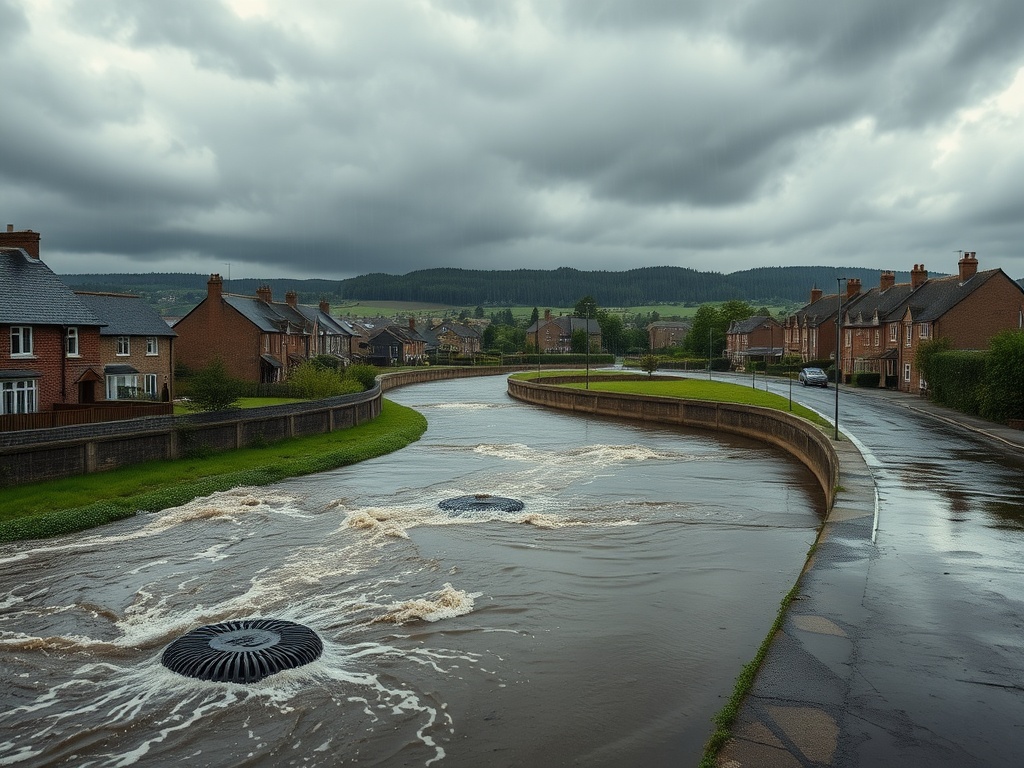Sewage Discharges Surge Across England Amid Heavy Rainfall

In the past 24 hours, nearly 470 incidents of sewage discharges have been reported throughout England. The situation is expected to worsen as the Met Office has issued yellow weather warnings for rain affecting the north-west and south-west regions of England, as well as parts of Wales and south-west Scotland.
Since Friday afternoon, a total of 468 sewage discharges have been documented, with 188 of these still active at the time of this report. Alarmingly, hundreds of sewage monitors have either been inactive or have not received updates in the last day, suggesting that the true number of discharges could be significantly higher.
The highest number of discharges was recorded by Southern Water, which reported 98 incidents across regions including Kent, Hampshire, the Isle of Wight, East Sussex, and West Sussex. This was closely followed by Severn Trent, which documented 73 discharges across its expansive service area from the Bristol Channel to the Humber and from mid-Wales to the East Midlands. United Utilities, covering Cumbria, Greater Manchester, Lancashire, Merseyside, most of Cheshire, and a small part of Derbyshire, also reported 73 incidents.
Ash Smith, the founder of the Windrush Against Sewage Pollution campaign group, expressed deep concerns about the situation, stating, “Water companies have become overly reliant on the ability to pollute illegally. One of the most frequently recognized illegal occurrences tends to happen during dry conditions. However, routinely breaking the law in plain sight, while being investigated yet rarely prosecuted by the Environment Agency, highlights a troubling reality. This is why illegal pollution has become such a common and alluring commercial practice.”
Smith continued, “The Environment Agency and Ofwat have both been negligent, and although they have been forced to take action, it is evident they lack the necessary understanding to navigate these issues effectively. Water companies are outmaneuvering both regulatory bodies.”
Matthew Topham, Lead Campaigner at We Own It, which advocates for public ownership of water companies, remarked, “In the last 24 hours, there have been 460 sewage discharges across the nation, even in areas experiencing minimal rainfall. This not only harms natural habitats but also pollutes the rivers and seas where our children play. This situation is not a natural occurrence but a result of chronic underinvestment in the essential infrastructure that delivers our vital water resources.”
He further added, “Funds that should have been allocated to fix leaking pipes have instead been funneled into the pockets of executives and shareholders. Over £72 billion has been lost to shareholder dividends since the privatization of water services in the past 35 years. There is a reason why 9 out of 10 countries have publicly-owned water systems: they function effectively. A staggering 82 percent of the British public support bringing our water services back into public ownership. It is high time the Government heeds the people’s call.”
Water companies are permitted to release sewage during extreme wet weather to prevent their systems from becoming overwhelmed. However, there are growing concerns regarding the frequency of these discharges.
To address the issue, Ofwat has authorized water companies in England and Wales to increase their rates by an average of £31 annually between 2025 and 2030. This measure is intended to generate funds necessary for upgrading the deteriorating infrastructure and enhancing customer service.
A spokesperson for Water UK stated that these bill increases will enable companies to invest more than ever before in “the natural environment,” supporting economic growth, facilitating housing development, securing water supplies, and ultimately halting sewage contamination in our rivers and seas. However, Thames Water has appealed to the Competition and Markets Authority (CMA) for permission to raise bills even higher than the 35 percent increase previously sanctioned by Ofwat for the same period. With £19.5 billion in debt, Thames Water recently won a High Court ruling to secure a £3 billion loan, initially receiving £1.5 billion to sustain operations until September 2025.
If the CMA approves its appeal, Thames Water—serving 16 million customers across London and the South East—will be able to access two additional £750 million tranches to extend its financial liquidity until May 2026. Following Thames Water’s lead, five other water companies—Anglian Water, Northumbrian Water, Southern Water, South East Water, and Wessex Water—have also lodged appeals against Ofwat’s approved rate increases.
A December investigation by the Office for Environmental Protection (OEP) revealed a failure among Ofwat, the Department for Environment, Food and Rural Affairs (Defra), and the Environment Agency (EA) to prevent water companies from discharging sewage into England’s waterways during periods of light rainfall. The watchdog has threatened to take legal action against all involved parties unless they outline corrective measures within two months.
An Ofwat representative stated, “We have pressured companies to take immediate action to reduce sewage discharges. We expect them to treat wastewater flows during typical weather conditions and to limit pollution from storm overflows, minimizing the adverse environmental impacts of any wastewater discharges.”
To support these efforts, Ofwat has approved almost £12 billion in investments aimed at reducing storm overflow spills by 45 percent by 2030. This investment package is designed to deliver environmental improvements and secure future water supplies.
However, Ofwat has also initiated an ongoing enforcement investigation into all wastewater companies, with a proposed penalty of £168 million already announced against three companies for violations. Thames Water faces a £104 million fine, Yorkshire Water £47 million, and Northumbrian Water £17 million.
Furthermore, it has been revealed that hundreds of sewage spills were downgraded in severity last year by the EA without any clear explanations. A total of 1,849 sewage pollution incidents, initially classified as having a “significant environmental impact,” were later reassessed to have “no impact,” according to data obtained through freedom of information requests.
The campaigning group 38 Degrees, which acquired this data, criticized the findings as indicative of a “glaring accountability gap” that allows companies to profit from performance bonuses based on environmental metrics.
The Labour Government’s forthcoming Water (Special Measures) Bill aims to impose stricter penalties on non-compliant wastewater firms, including potential prison sentences of up to two years for executives who obstruct investigations. This new legislation will also empower the EA to impose “severe penalties” more swiftly for pollution-related offenses without necessitating extensive resource allocation to lengthy investigations.
Water UK, the industry representative, has been contacted for comments, as have Southern Water, United Utilities, and Severn Trent.




